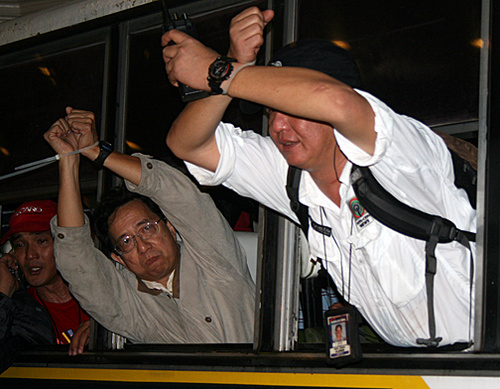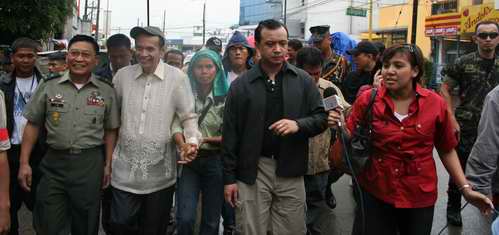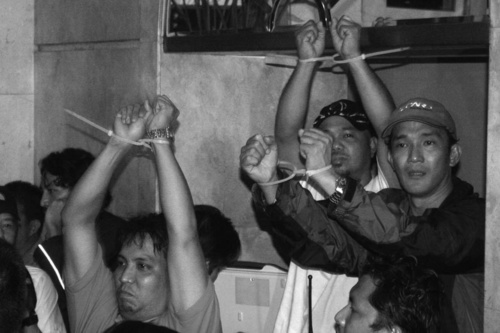Lawyer Romel R. Bagares, of Butuyan & Rayel Law Offices, representing more than 30 members of media and media groups, filed Feb. 8 a motion for reconsideration for the Supreme Court First Division to elevate to the En Banc the case against officials of the Arroyo government over the arrest of reporters that covered the protest staged by a group of military officers led by Sen. Antonio Trillanes IV and retired Brig. Gen. Danilo Lim, who is now Metro Manila Development Authority chairman, 11 years ago.
In a Facebook post, Bagares said the Oct. 1, 2018 decision of the G.R. 210088, “the SC, via (now retired) Justice Noel Tijam, basically gave a blank check for police to truss up journalists and haul them away from a developing news event, on the pretext that they are doing it for their own good.”

DZMM’s Noel Alamar (in white) and Tribune’s Herman Tiu Laurel (in grey jacket) raise their handcuffed hands in protest while being brought to Camp Bagong Diwa for “processing” after the Manila Peninsula seige 11 years ago.
Disclosure: I am one of the petitioners together with Charmaine Deogracias, Ashzel Hachero, James Konstantin Galvez, Melinda Quintos de Jesus, Vergel o. Santos, Yvonne Tan Chua, Booma B. Cruz, Ed Lingao, Roby Alampay, Jessica Soho, Maria Judea Pulido, Michael Fajatin;
Connie Sison, Rawnna Crisostomo, J.P. Soriano, Gena Balaoro, Michelle Seva, Leilani Alvis, DaniloArao, Leticia Z. Boniol, Rowena c. Paraan, Iris C.Gonzales, Ma. Cristina V. Rodriguez, Marlon Ramos, Leah Flor, Manolito C. Gaya, Erel A. Cabatbat, Vincent Cristobal, Jesus D. Ramos, Michael C. Carreon, Ed de Guzman; Ma. Aurora Reyes Fajardo, Elizabeth Judith C. Panelo, Angel Ayala, Nilo H. Baculo, Sr.;
The Center for Media Freedom and Responsibility and the National Union of Journalists of thePhilippines.
This case was filed 11 years ago so you will note that the title or positions of the respondents no longer apply. Some have already passed away.
Named respondents were DILG Secretary Ronaldo Puno, Justice secretary Raul Gonzales, Defense Secretary Gilberto C. Teodoro, PNP ChiefAvelino Razon Jr., NCRPO Chief Geary Barias, Chief Supt. Luizo Ticman, Chief Supt.Leocadio Santiago. Jr. of PNP Special Action Force, Sr. Supt Asher Dolina, AFP Chief of Staff Hermogenes Esperon.
The case stemmed from theNovember 29, 2007, Manila Pen stand off which started when Trillanes, Lim andother members of the Magdalo group, walked out of the Makati Regional Trial Court hearing of the July 2003 Oakwood mutiny.

Then ABS-CBN reporter Charo Logarta interviewing Sen. Antonio Trillanes IV who was leading the march to Ayala Avenue after walking our of the hearing at the Makati City Hall.
What does a reporter do when something unusual happens during an event he or she is covering?
We did what a journalist should do. We followed the Trillanes and Lim group out to the streets up to Manila Peninsula Hotel, which they took over. They held a press conference at the lobby, calling for the ouster of Arroyo who at that time was embroiled in scandals including the 2004 elections cheating.
Police authorities, who arrived long after Trillanes and Lim’s groups had taken over Manila Pen , demanded that the reporters leave the hotel.
In the SC’snarration of the events, it stated:” The police officers then gave Trillanes’ group until 3 0’clock that afternoon to vacate the premises. Despite these orders, however, petitioners Ellen Tordesillas, Charmaine Deogracias, Ashzel Hachero, and James Konstantin Galvez, opted to stay inside the function room with Trillanes’ group.
“When the 3 o’clock deadline lapsed, the police authorities hurled tear gas canisters inside the hotel lobby and fired warning shots before breaking into the hotel to arrest Trillanes and his group. The members of the press who were inside the function room were also taken by the police officers and were brought to Camp Bagong Diwa with Trillanes’ group. After processing, the said members of the press were cleared and released before midnight of the same day.”

Many of those who stayed with Sen. Antonio Trillanes IV and Brig. Gen. Danilo Lim, including members of media, were handcuffed by police officials.
The narration missed important moments in what is referred to as the Manila Pen siege.
In setting the 3 p.m. deadline, NCRPO Chief Geary Barias said they were putting up a tent outside the Manila Pen which would serve as press center where reporters can get an update of what was happening inside.
Many of us found that situation ridiculous. We were inside the hotel at the center of the unfolding crisis, giving the public firsthand account of the situation and Barias wanted us to abandon our reporting and get the sanitized version what was happening from him who was not even near the rebel officers.
After deadline had passed, the authorities rammed an Armed Personnel Carrier into the hotel lobby. After the rebel officers surrendered and were arrested, the Special Action Force started handcuffing the journalists. Some of us- Ces Drilon, Charmaine Deogracias and I – refused to be handcuffed.
This was the exchange between the SAF officers holding a plastic thing for handcuffing and the journalists who were protesting:
Journalists: Why are we being arrested?
SAF: Obstruction of justice
Journalists: What did we obstruct? What did you want to do with the rebel officers that you were not able to do because we were there?
We never got answers to these questions.
Some of those who were arrested decided to file a Complaint for Damages and Injunction with Prayer for Preliminary Mandatory Injunction and/or Temporary Restraining Order (TRO) against respondents. We were joined by other members of media who were outraged by our arrest.
We averred that the warrantless and oppressive arrest when we were just peacefully exercising our constitutional rights, clearly violates our right to press and project a “chilling effect” on such constitutionally-protected freedom.
We also asserted that the acts complained of constitute prior restraint, as such acts prevented us from carrying out our duties to report on a matter of public interest.
The Makati RTC denied our application for TRO. We elevated it to the Court of Appeals which sustained the Makati RTC decision. We elevated it to the Supreme Court.
In its decision affirming the CA’s resolution Associate Justice Noel Gimenez Tijam (now retired) dismissed our assertion of the chilling effect of our arrest. He said: “Neither was there any indication of the claimed chilling effect on the exercise by the media of the right to free speech and press. It is of public knowledge that news and commentaries as regards the incident continued to be disseminated thereafter. There was no allegation, much less proof, that the media opted to step back from or refused to cover similar events due to fear of incurring criminal liability pursuant to the challenged advisory.”
Concurring with Tijam was then Supreme Court Justice Teresita de Castro, Associate Justice Mariano del Castillo and Associate Justice Andres B. Reyes, Jr.
What disturbs me with this SC decision is that, it’s the authorities who can now decide what I can cover and where to cover it. They are now making the editorial decision for the journalists.
Statements on the Manila Peninsula siege during the Dec. 13, 2007 Senate Investigation
Ces Drilon’s account of the Manila Peninsula incident Nov. 29, 2007
Maria Ressa Position Paper read during the Senate hearing
